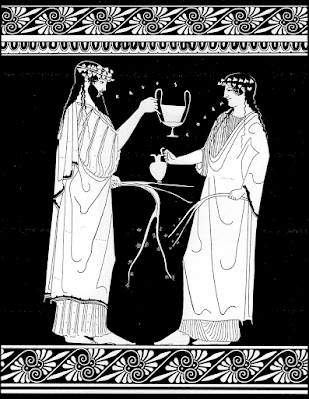 |
| I chose this picture because of that fur rug Sappho is sitting on. |
NOTE: This article continues my coverage of Ed Wood's When the Topic is Sex (BearManor Media, 2021).
The article: "Sappho Revisited." Originally published in Woman's World (Gallery Press), vol. 2, no. 2, March/April 1973.
Excerpt: "First it is probably a researcher who would find that the stories of depraved orgies and homosexual abandon which supposedly took place at Sappho's school are pure fiction. Second, in her time and throughout the ancient world, Sappho was highly respected by all. Third, during most of Sappho's life there lived on the island of Lesbos another woman of the same name who in her own way was one of the greatest whores in history. This woman would do anything, with anyone, for a price."
 |
| Poetry pals: Alcaeus and Sappho. |
Reflections: At the outset of this review, I will have to admit a weakness on my part: I know virtually nothing about the ancient Greek poetess Sappho other than the fact that she's from the isle of Lesbos, her poems are mostly lost, and her name is synonymous with lesbianism. (And I got most of that from—you guessed it—a recent Saturday Night Live sketch.) That's it. I don't really even have a basic blueprint of Sappho's life, i.e. how she lived, how she died, what she was really like, etc.
Considering how important Sappho seems to have been to Ed Wood and how often her name comes up in When the Topic is Sex, I should have started researching her life months ago. When you were a student, did you ever have to take a test that you hadn't studied for? If so, you know how I feel as I attempt to review "Sappho Revisited." I'm winging it and hoping for the best.
Lacking any real knowledge of Sappho's life, I will attempt to approach this article from a contemporary angle. By now, we are all familiar with the highly controversial term "cancel culture." Some claim that it does not exist; others say it is pervasive. Either way, when a famous person is shamed on social media for some word or deed (or pattern of words and deeds), we say that this person has been "canceled." Does this mean the end of that celebrity's career or public life? It depends.
I believe that "cancel culture" is a misnomer. Living celebrities, no matter how heinous their words or deeds might be, can never be completely "canceled," i.e. erased from existence. We can boycott their work, remove them from certain platforms, and deny them various career opportunities, but we cannot silence them forever. Louis CK, for instance, will likely never be a guest on any network TV show again, but he can still perform standup comedy in public and market his own work via his personal website. Does that mean cancel culture doesn't exist? No, I don't think so. It just means that cancel culture isn't all-powerful.
Dead celebrities, on the other hand, can be canceled pretty thoroughly. Look, there's no comeback on the horizon for Kate Smith. The once-beloved contralto died in 1986 but didn't really become controversial until 2019. Being dead, Kate can't apologize for her old recordings or go on some kind of "damage control" media tour. Unlike Louis CK, she cannot perform in public or make new recordings. In other words, she's done. Kate Smith is canceled. The bell has rung upon her great career.
 |
| Ed Wood consulted The Dykes. |
The question I asked myself after reading "Sappho Revisited" is: Should Sappho be canceled? It's happened to historical figures before. Look at Christopher Columbus and Andrew Jackson. Once heroes, their reputations are now in the dumper. Ed Wood admits that much of the information we have about the Greek poetess is sketchy—rumors, hearsay, urban legends, etc. But this article does air some pretty disturbing allegations. To wit:
As legend has it she was known to lure beautiful young girls into her trust and many of them were sent to her from all over the ancient world for their tutoring. And once they were secreted into her house she approached them with brilliance and cunning and when the training period started, enjoyment for her, the girls were seduced into a life of depravity and debauchery. It was claimed that lurid homosexual rites and complete submission to her own sexual desires were her demand. However, no one actually knows what she did when she embraced these girls in entwined passion.
Today, we'd call that kind of behavior "grooming," and Twitter would be demanding Sappho's head on a platter. Ed Wood himself admits that this could all be misinformation, based on nothing more than people's imaginations. But, generally, accusations are enough to get you in serious trouble on social media, especially when those accusations involve sexual misconduct.
Anyway, apart from Sappho herself, the most interesting character in "Sappho Revisited" is Alkaios (aka Alcaeus of Mytilene), another ancient Greek poet. He and Sappho may have exchanged some verses back in the day. Ed Wood paints quite the picture of Alkaios:
This man, Alkaios, was a wild aristocrat slightly older than Sappho. He had only recently returned to Mitylene from the wars. He had a somewhat shady war record, and he was a well known drunken, bawdy, rabble rouser who seemed perfectly content with the fact that he had turned his back to the enemy under fire, and ran. However back home in Mitylene he was overly content to explode and expound his loud voice on the political scene, and he indulged in sexual excesses with every whore in the city and became hopelessly drunk every night. It is quite possible that he was impotent and certain that among his so-called girlfriends he counted the famous prostitute of Mitylene who held the exact same name as Sappho the poetess.
It's my belief that Ed Wood modeled Alkaios somewhat after himself. As I read this article, I couldn't help but think of Alkaios as an ancient Greek version of Mr. Murphy, Eddie's whiskey-swilling bon vivant character in Love Feast (1969). "Sappho Revisited" alleges that it was this "drunken bum" who took the poetess' virginity and was also responsible for her being exiled from Lesbos, since he involved her in a foolish plot to murder the ruler of the island. I cannot begin to tell you if any of this is historically accurate.
As for research materials, Ed Wood cites only one book: The Dykes (1968) by Jan Hudson (a pen name of George H. Smith). Unsurprisingly, this is a Pendulum paperback. Did Bernie Bloom pressure Eddie to plug Pendulum books in his articles? Or did Eddie consult The Dykes simply because there was an extra copy lying around the office on W. Pico Blvd.? Specifically, Ed quotes extensively from the foreword by Dale Koby. I'd never heard of Mr. Koby, but apparently he was a high school teacher turned smut author. Sounds like my kind of guy.
Next: "Lesbian-Involved Prostitution" (1971)

No comments:
Post a Comment